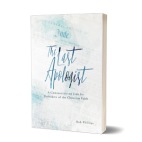The prophecy of Enoch
 This is the ninth in a series of excerpts from the new MBC resource, “The Last Apologist: A Commentary on Jude for Defenders of the Christian Faith,” available at mobaptist.org/apologetics.
This is the ninth in a series of excerpts from the new MBC resource, “The Last Apologist: A Commentary on Jude for Defenders of the Christian Faith,” available at mobaptist.org/apologetics.
__________
Near the end of Jude’s epistle, he quotes a prophecy from Enoch: “Look! The Lord comes with thousands of His holy ones to execute judgment on all …” (vv. 14-15).
Nowhere in Scripture does Enoch’s prophecy appear, leading some to dispute the inspiration of Jude. After all, it is argued, if a writer inspired by the Holy Spirit shares an ancient prophecy about the end of days, why not select a prophecy that already has found its way into the canon?
However, there is good reason to accept the prophecy of Enoch as the very words of God.
The quotation is from the Book of Enoch, a pseudepigraphical work attributed to the great-grandfather of Noah. The book is not considered canonical by most religious groups, but it was familiar to Jewish Christians in the first century, and cited by second-century church fathers.
Specifically, Jude draws from Enoch 1:9, which reads, in part: “And behold! He cometh with ten thousands of His holy ones to execute judgment upon all, and to destroy all the ungodly …”
Jude’s quotation is similar but not identical. Perhaps this is because Jude cites a portion of the Book of Enoch the Spirit confirms as genuine, tightening up the language from its non-inspired source. As Edward Pentecost writes, “If Jude quoted the apocryphal book, he was affirming only the truth of that prophecy and not endorsing the book in its entirety.”
Book of Enoch
It may help to consider the background of the Book of Enoch, which appears to be a secondary source that draws from the Old Testament. By quoting Enoch, then, Jude indirectly quotes the passages to which the Book of Enoch alludes. But which Hebrew Scriptures are Enoch’s primary sources?
James VanderKam, a professor of Hebrew Scriptures and a noted expert on the literature of Enoch, writes that Enoch’s reference to the “holy ones” derives from Job 5:1 and 15:15, as well as from Daniel 4. This reference to God’s celestial band recalls Deut. 33:2, while Zech. 14:5 envisions an advent of God along with His holy ones. Further, Dan. 7:10 pictures God as surrounded by myriads of heavenly attendants at the time of judgment.
The point here is that Jude does not simply snatch a convenient text from a non-canonical book in order to build his case. Rather, in quoting from the Book of Enoch, he affirms the Old Testament texts from which the book is drawn. And he applies Enoch’s prophecy about false teachers in the last days to interlopers in the first century.
Enoch’s prophecy is the earliest human prophecy found anywhere in Scripture. Only the prophetic promise of God regarding the “seed of woman” is earlier (Gen. 3:15). In fact, Enoch’s message predates the words of Moses, Samuel, and the Hebrew prophets by many centuries.
Why trust this prophecy?
Still, we might ask why Jude draws from this material in the first place. Isn’t it better to quote directly from Deuteronomy, Job, Daniel, or another canonical book to make the point that the Lord is coming to execute judgment, and that He’s not coming alone? Perhaps. But Enoch’s prophecy is consistent with the others.
Equally important, Jude may be using this quotation because it comes from ancient literature his opponents favor. Thus, he turns their venerated scriptures against them, much as Jesus does to the Sadducees, who think they’ve wrestled Him to the ground on the issue of the resurrection with their hypothetical case of a woman married consecutively to seven brothers (Matt. 22:23-33). They ask, “[I]n the resurrection, whose wife will she be of the seven? For they all had married her” (v. 28).
Jesus responds, in part, by taking them back to the Torah, which they regard as sacred. He could have cited Job 19:25-27 or Dan. 12:2, but instead He quotes from Exodus 3: “Now concerning the resurrection of the dead, haven’t you read what was spoken to you by God: I am the God of Abraham and the God of Isaac and the God of Jacob? He is not the God of the dead, but of the living” (vv. 31-32; quotation from Ex. 3:6, 15-16).
Perhaps in a similar way, Jude silences his critics by drawing from their vaunted texts to show that they are the objects of God’s future wrath.
We also should keep in mind that Jude’s quotation of a non-biblical source has a precedent in the apostle Paul. In several separate passages, Paul quotes Greek poets (Acts 17:28; 26:14; 1 Cor. 15:33; and Titus 1:12). And in 2 Tim. 3:8, he alludes to ancient Jewish traditions. Yet Paul doesn’t endorse everything in these works, nor does he consider them Scripture. Like Paul, Jude cites familiar works to make a point.
While the sources from which Paul and Jude draw lack divine inspiration, they become part of inspired Scripture in the context of their epistles, written under the direction of the Holy Spirit.
Next: Who are you to judge?

Order your copy of The Last Apologist from the MBC or Amazon.
